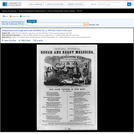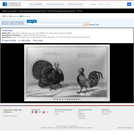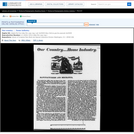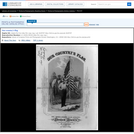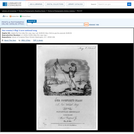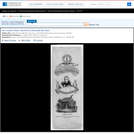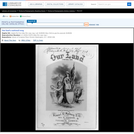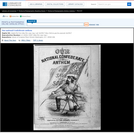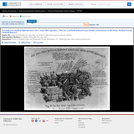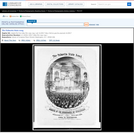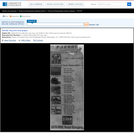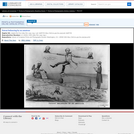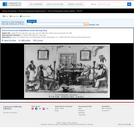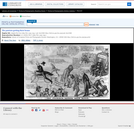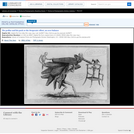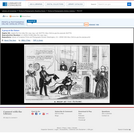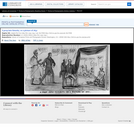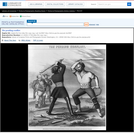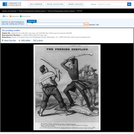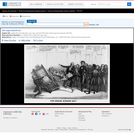
The Senate's February 1847 resolution barring reporters and editors of the "Washington Union" from the Senate floor and gallery was the basis for the artist's demeaning portrayal of the newspaper's powerful editor Thomas Ritchie. In the February 9 edition of the "Union," the mouthpiece or "organ" of the Polk administration, Ritchie strongly criticized congressional opposition to President Polk's efforts to raise additional regiments of troops for the Mexican War. His characterization of the bill's defeat as "another Mexican victory" outraged many legislators, particularly South Carolinian John C. Calhoun, who accused him of libeling the Senate. Here Ritchie, clad as a jester and holding a copy of the "Union," is literally kicked toward the left by a group of angry senators. Ritchie seems to be either kicking or falling onto a small pipe organ (double-entendre for his paper's bias) which displays sheet music for "Clar De Kitchen." The title of this popular minstrel tune is here probably a swipe at the "Kitchen Cabinet," a derisive name given by opposition critics since Jackson's time to the President's informal advisors. The organ topples to the left, alarming James K. Polk, who exclaims, "Oh my poor "Organ," I'm afraid this kicking will put you sadly out of tune!" Ritchie, thumbing his nose (one assumes toward the senators) assures him, "If [Polk's Democratic predecessors] Jackson & Van Buren survived the proscriptive edicts of the Senate, surely we have no reason to consider Ourselves demolished! "in Union is strength," Nous Verrons!!" Senators Daniel Webster and John C. Calhoun (center, each with a boot on Ritchie) exclaim: "You may say that your account with us is "footed" up!" and "We'll teach you to play more respectful tunes when in our presence!" Between them stands another senator holding a copy of the expulsion resolution; he says, "I move for the expulsion of the Kings fool from the floor of the house!" This is seconded by several others. Also present are senators David Levy Yulee and James Diament Westcott, Jr., Democrats who voted for the resolution. Yulee (to the right of Calhoun, his back to the viewer), the Florida legislator who introduced the expulsion resolution, says,"I think Wescott, we've given him a lesson he won't forget!" Westcott agrees, "Aye, aye, Yulee, you, Calhoun, Butler & Myself may look out for some big licks!" (The four Democrats were in fact the targets of particularly strong editorial attacks by Ritchie). A third man (who may be intended to be Senator Andrew P. Butler, but bears no resemblance to him) concurs, "Nous Verrons! as the poor fool says!"|Robinson Lith 142 Nassau St. N.Y.|Signed with monogram: EWC (Edward Williams Clay).|Title appears as it is written on the item.|Weitenkampf, p. 89.|Forms part of: American cartoon print filing series (Library of Congress)|Published in: American political prints, 1766-1876 / Bernard F. Reilly. Boston : G.K. Hall, 1991, entry 1847-1.
- Subject:
- History
- U.S. History
- Material Type:
- Diagram/Illustration
- Primary Source
- Provider:
- Library of Congress
- Provider Set:
- Library of Congress - Cartoons 1766-1876
- Date Added:
- 06/13/2013
